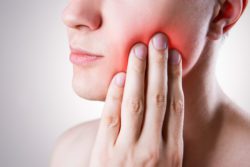Bruxism is a condition where you grind your teeth or clench your jaw. You may not be aware of the behavior because sometimes it occurs during sleep. It can also be a response to stress, so you may not know about it until it starts causing problems.
If you don’t notice grinding your teeth, you may notice pain or sensitivity in your teeth. Bruxism can also cause tension or fatigue in your facial and jaw muscles. Headaches are common in people who grind their teeth because they put excess strain on jaw and neck muscles.
In addition, you may see impressions of your teeth on your tongue, which means you are clenching your jaw. Over time, you may even see chips or cracks in your teeth.

Risks of Bruxism
Most doctors and dentists will agree that the exact causes of bruxism are unknown. However, there are some risk factors that can increase the likelihood of grinding your teeth.
Stress is a common reason why you may grind your teeth. In fact, anything that may cause tension in the body may lead to clenching your teeth. This can include a hyperactive or aggressive personality, a high-stress environment or job, or a change in routine.
Some medications include bruxism as a side effect. Along with prescription medications, other drugs and substances can also cause teeth grinding. Alcohol, caffeine, and tobacco use can increase the likelihood of bruxism.
Other risks of bruxism are related to genetics or certain medical disorders. For example, if you have family members who grind their teeth, you have an increased chance of grinding your teeth. In addition, conditions like epilepsy, Parkinson’s disease, attention-deficit/hyperactivity disorder (ADHD), and sleep apnea increase the chances of bruxism.
Complications of Bruxism
While some cases of bruxism are mild and do not need treatment, it can create more issues over time.
Constant grinding of the teeth can wear down the enamel, which is the protective outer layer of your teeth. Without the enamel, your teeth can become sensitive to temperatures, sugars, and acids. In addition, enamel loss puts you at risk of tooth decay, meaning it cannot be replaced once the enamel is gone.
While teeth are made of the strongest material in the body, they have their limits. Grinding teeth can cause them to break or chip, so they will require restorative solutions. Broken teeth need repair quickly so that the damage doesn’t continue to worsen.
Stress in the jaw and face can cause tension headaches or muscle aches in the face, neck, and shoulders. Additionally, your face can become sensitive to the touch and even cause your jaw to ache. Muscle pain and discomfort in the face and jaw can also affect your sleep pattern.
Constantly clenching your teeth can lead to other disorders like TMD (temporomandibular joint disorder). TMD is a condition that affects the ability of the jaw joint to move efficiently and without difficulty.
